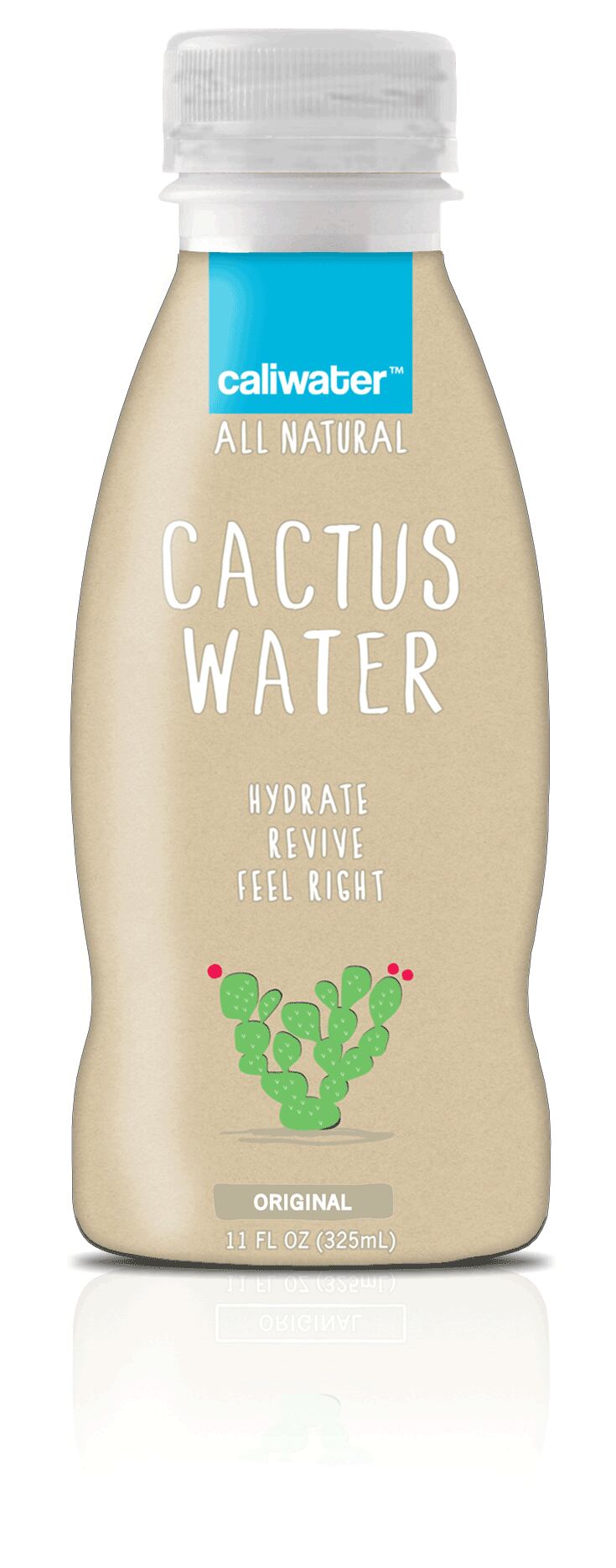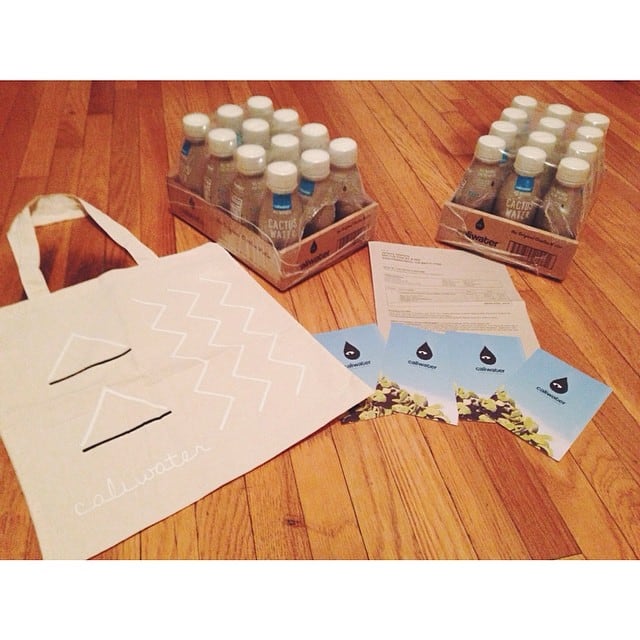Now the founders of Caliwater are eyeing growth beyond the natural products sector with what they’re calling the next iteration of earthy-enhanced waters, as the wider marketplace is showing signs of sugary beverage fatigue.
“We’re right now in a place where Zico was in 2003 or 2004, when they walked into the office of a buyer or retailer with their coconut water having to create a need where a lot might not think there was a need. We’re having to basically say ‘hey, cactus water is a thing, and it is the next thing.’”

A respite from added sugar beverages
The beverage is a blend of prickly pear cactus juice and extract (the fruit taste like a cross between watermelon and raspberry), filtered water, stevia and organic lemon juice to round out the flavors. Each 11-ounce bottle contains 32 calories and 7 grams of sugar. When asked who Caliwater is targeting, McKee quipped that the product is offering consumers daily relief from sugary beverages.
“We’re basically looking at a marketplace where sugary sodas are losing money like crazy,” he said. “We’re seeing consumers resist things that are high in sugar content. We wanted to bring something to market that’s not high in sugar or calories, but also not devoid. The natural juice in our product brings natural sugar, and we use a little organic stevia to add a pop of sweetness, but there’s no added sugar.”
McKee is aware that the brand faces a fairly steep uphill climb, as coconut water is still king of the earthy waters realm and prickly pear cactus as a food ingredient is still largely overlooked in North America. Hispanic cultures are quite familiar with it and its health benefits—which include an “abundance” of naturally occurring electrolytes and anti-inflammatory properties, along with low glycemic levels.
“Where we live in Southern California, there’s a very strong Latino market. Products like aloe juice and cactus sell a lot more here because they are widely accepted among Hispanics and Mexicans especially,” he said. “So our goal is to really simplify the messaging for the wider market: that you can work this product into your everyday life and it will provide a unique series of benefits.”
You can work this product into your everyday life and it will provide a unique series of benefits
Caliwater officially launched on Jan. 1, 2014, though the concept was in development for about two years. After a bit of trial and error in their home kitchens with some local cactus fruit and an old juicer, McKee and Reed hired a beverage industry consultant to help with formulating and costing the beverage. They began production in the summer of 2013.
One of the toughest parts of the process, McKee said, has been fostering a relationship with the cactus harvesters, given his and Reed’s lack of experience and contacts in the beverage industry.
“It seemed insurmountable to go to harvesters directly to start a relationship,” McKee said, noting that the consultant helped them find a few local growers. “By this fall, we will be working with the harvesters directly, and the water will be harvested solely in California, which is really important for us.”
And the most time-consuming step? “Finding a co-packer,” he added. “We’re a young company, family owned, and we don’t have super deep pockets. It was too early to bring in other investors to scale up. We had to rely on who would work with a smaller minimum and how could we make best product possible for not a ton of money.”

Case study: Om Nom Organics
It helped that McKee was in the process of launching an organic food store, called Om Nom Organics, in downtown LA around the same time Caliwater was going into production.
“We launched at our own organic food store late last year—we really used it as a case study,” McKee said. “We put the product on the shelf and put a price tag on it to see if it would take on a life of its own without coupons or marketing. It’s been selling really well against coconut water, aloe juice and other products in the same family.”
The mini case study also enabled McKee to determine the best shelf placement for Caliwater. “I moved it around to see if it played better next to the juices or coconut water. Now I know the best home for it is sandwiched in the aloe juice and coconut water section.”
Once the brand was proven at Om Nom, McKee and Reed started approaching local retailers with an eye to Expo West 2014 in Anaheim, CA. “We wanted to get a few local stores under our belt before Expo,” McKee said, noting that the best way to improve a product is through “sampling to as many thousands as possible”. In addition to Om Nom, Caliwater is sold on Amazon.com, and in regional natural food and lifestyle retailers Locali, BodyFactory and Lassen’s.
Since Expo West, the firm has been approached by various national retailers and larger distributors, though McKee says the company wants to keep the focus in California and Southern California for most of this year in order to meet the scaling-up, marketing and sampling requirements of its existing retailers. This summer, the brand is launching a field marketing campaign at several of its participating retailers to help consumers get over the "hurdle" of what Caliwater tastes like and why they should drink it.
Paving a road with the first RTD natural cactus water of its kind
“I’m basically trying to be strategic in how quickly we scale up,” McKee said. “We’re having to pave a road here with the first RTD natural cactus water of its kind. If I run half a million units and ship them out and there’s an issues, that’s the last thing I want to deal with. I’d rather focus on made-to-order runs for retailers and distributors instead of going too big to fast.”
Scaling up is also limited by cost constraints, as the product is processed aseptically. “Aseptic filling is an expensive way of going about this—there are high minimums everywhere you go,” he noted. “At the same time, for our first production run it afforded us more time to be able to move product.” But Caliwater isn’t currently a candidate for HPP processing, as the cactus fruit still demands aseptic processing, McKee noted.
The firm doesn’t see supply becoming an issue for the near future, unless cactus water is indeed the next coconut water and scores of other manufacturers jump in. “If it really is a hit, we’d have to look a little further from home to source it,” McKee said. “It grows abundantly throughout different regions of the world, so there are options, but we’re first hoping to secure the right relationships in our backyard. It is called Caliwater after all.”
McKee has similar sentiments about expanding the product line, and remains cautious about moving into other flavors or ingredients when the company has put so much into the prickly pear cactus.
“We’re going to work as hard as we can on this product and let market tell us where to go from there. We have some other flavors in development, but our eyes are pretty fixed on this product for the foreseeable future. Time and the market will tell.”
